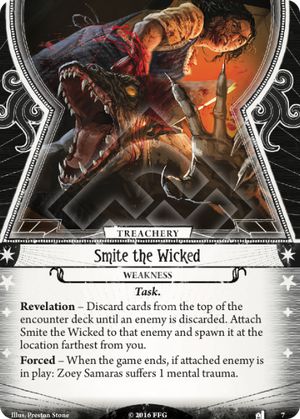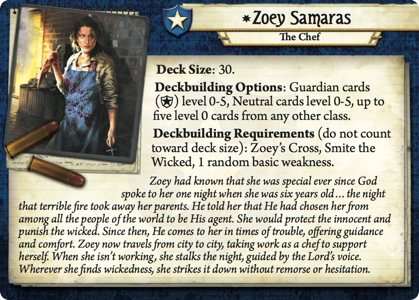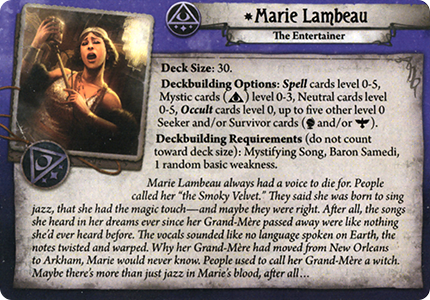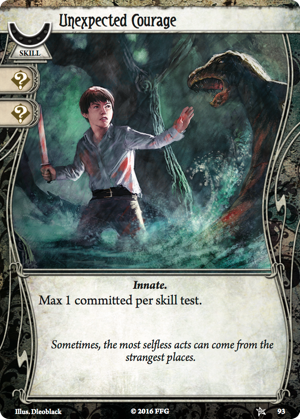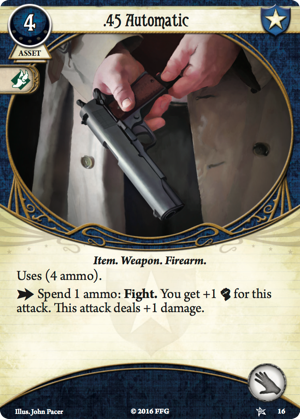Rex’ story
is one of the coolest backstories of all Arkham Files investigators. It has
been made even more complete in the latest installment, which explains his
analytical abilities are not just inherited in the gene pool, but more of a
reaction he developed to deal with all the mishaps happening around him.
Legacy: Rex’ design has been a nice balance of strong drawback
caused by being cursed (in Eldritch Horror – for the entire game!) and an even
stronger ability to counter this disadvantage. While in Eldritch you might
consider him sort of an all-round investigator (who can be customized a bit
with the starting upgrade of player’s choice), Arkham Horror’s design makes him
a clue gathering gate closer (relying on sneaking into them past the monsters).
His clue gathering side is once again brought back to live in AH:TCG, and he
can also sneak quite well because…
Skill values: …due to his more balanced (compared to Daisy)
skills, he can actually count on evading some monsters on his own more
consistently. It comes at cost of 1 Intellect, which hurts a bit, as his
special ability depends on passing the test with a wide margin (more about it
in just a minute)1. It is not the end of the world, however. He has
access to plenty of intellect boosting cards, so manages to investigate very
successfully. He is just not quite as great at using I’ve got a plan! or Mindover Matter. All in all, I believe Rex’ set of skills allows him to achieve
his goals through slightly simpler means. As it’s often the case for me, I’d
see more of a radical approach more efficient – Combat of 1 would allow to
boost any of other 3 stats, and each one would have its benefits.
It is hard
to comment on thematic value of his skills – he is sort of a bit fragile
(though his Stamina is one higher than Daisy’s as he profits from Dunwich
Legacy’s higher Sanity/Stamina total) non-fighting, clever dude. So I guess
solid work here.
Strength
Theme
Special Ability: Oh my! Rex absolutely dominates here in all
possible (sub)categories! First of all, the ability grants him an astonishing
action-efficiency. It goes without saying, that doubling the result of a vast
majority of actions he takes during a game creates a colossal advantage. As
long as he spends most of the time investigating, he even dwarfs Daisy’s free
action. Consider following example – if both he and Daisy spend one action on a
tome and the rest investigating, Rex actually gets one clue more (provided he
succeeds, obviously, both times triggering his ability). This is why he should
spend as much time as possible investigating. It makes him a strong team player
– his team members take care of all other threats, while he searches for
evidence.
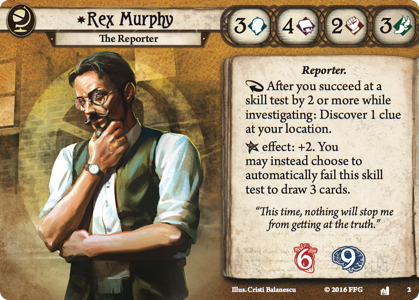 |
| Rex' ability, while already superb has been made even stronger by polish (miss)translation which omits "while investigating" |
The ability
also provides a very interesting gameplay experience – you balance the odds at
each location, deciding if (usually it’s more of a question of “how?”) you want
to aim for 2 clues. Since he’s almost destined to be built around Scavenging
(more about it in 2-3 minutes)2, it involves planning how to best use
it and all the available icons in your hand. Therefore despite being just as
one dimensional as Zoey, he feels so much more exciting to play.
Last, but
not least, using this ability grants me great deal of nostalgia, as it is a
very clever reimplementation of Rex’ original special ability from Arkham
Horror. And they both make great sense thematically – he has a very analytic
mind, thus adding things together quicker – drawing conclusions as well as
linking one clue with whereabouts of the other3.
I am
impressed and almost made speechless by Rex’ Elder Sign ability for so many
reasons. Firstly, it introduces a choice. As you know, in my textbook choices
in a game = good. And the choice is a very cool one. Sometimes it’s obvious you
cannot afford to fail a test, but there are occasions, when you really feel
torn between two options. Secondly, it adds to his theme of drawing cards
(along with his signature card) and has a terrific interaction with his
weakness (more about it in a minute)4. It is truly a blast!
Gameplay
Theme
Signature Cards: Seekers, as a class, do have some
card-drawing capabilities (See: Old Book of Lore, Cryptic Research). Rex’
signature card fits this pattern nicely and creates a lovely interaction with
his clue gathering ability. It also builds a clue gathering AND card drawing
theme for the character (along with the Elder Sign effect). Its power is
strongly correlated with the scenario clue-approach – in some scenarios you can
reliably plan to use it, in other it’s very hard to make good use out of it. In
this way it plays similarly to “I’ve got a plan” (more about it in a week)5.
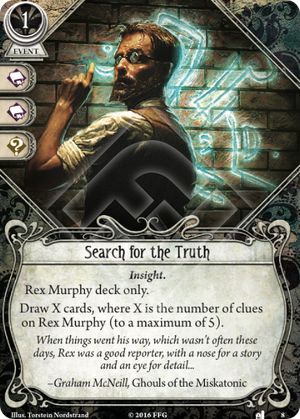 |
| In his spare time, Rex enjoys painting graffiti |
Generally speaking,
card drawing abilities are very strong in card games, as they simply give you
more options. AH:TCG does not differ from the standard card game. In fact, drawing 3
cards with Search for the Truth is already a decent result and a fairly achievable
one. Even if for some reasons (full hand?) you decide not to use it, its
massive icons for sure will come in handy to help Rex trigger his ability
Rex’ Curse
seemed to me to be a very clever design choice. It’ supposed to create an ever-reoccurring
jinx, haunting Rex and nullifying his efforts. In the practice, however, it
does not do much. Unless you’re very *khem* unlucky or playing a long scenario,
your chances of seeing it more than once are rather slim. Even with some added
draw potential of Rex you might easily not see the card at all.6 Secondly,
quite often it doesn’t impact chances of passing the test too heavily. It can
even help a bit, sometimes allowing you to pass by 2 or more (I admit, it’s a
rare case). To be honest one of most impactful effects of the curse is an
increased chance of triggering nasty Chaos Token effects (adding doom to the
enemies etc.) as effects of both drawn tokens apply. Even so, some chance for
extra negative results on top of causing you to fail one test is rather not
something to be overly concerned about.
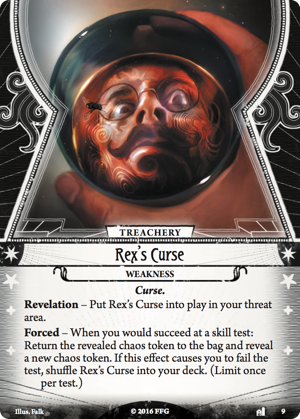 |
| Dear Lord, my 'stache DOES look fabulous |
The card
extends the gameplay in an annoying way, adding to the most important drawback
of the chaos bag – time it takes to perform the physical act of randomizing the
bag and drawing a token. It’s even more frustrating if you’re pulling one token
after another.
Just to be
on the safer side, should you expect a crucial (and rather hard) skill check
coming soon, strongly consider using a choice to fail a skill check with the
Elder Sign effect (provided you happen to draw it during the re-draw
procedure), as it allows to both get rid of the curse and draw 3 cards.
The curse
originally promises to deliver a very thematic experience, but seems to fail a
bit in this regards (again – unless the scenario is one of the long ones).
Strength
Theme
Deckbuilding/Class: As one can easily predict, Rex has
been designed as a Seeker. And this class definitely fits him very much. So
much, that in fact I even somehow accept him as a pure Seeker. A Survivor
subclass would fit him, too – even more so due to the Scavenging build – if not
for so many Fortune cards which would still be unavailable for him due to his
deckbuilding restriction (a super thematic one, by the way). While one can toy
with different sub-variants of his Seeker/Neutral set of cards (Mind over
Matter is, for instance not as a straightforward choice as for Daisy, while
Manual Dexterity and Hyperawareness make much more sense), he seems to be
designed with (ab)using Scavenging in mind, which almost forces to include 2 copies
of Scavenging and at least one of Rabbit’s Foot. It definitely provides a
powerful synergy, it limits reasonable variants (at least for now) available
for Rex’ deck, though.
Strength
Theme
Like his
Dunwich friend, Zoey, Rex is designed with one job in mind. For Zoey it’s
putting an end to the existence of wicked monsters. For Rex it’s discovering
the horrible truth about sacrilege forces bringing doom to mankind. His power
lies mostly within his ability, a clearly superb one (possibly the strongest
special ability so far). He is yet another great Seeker character with a clear
purpose and strong design. He definitely does best work in a team – the bigger
the team, the better, as he can vacuum clean all the clues from a location in
no time.
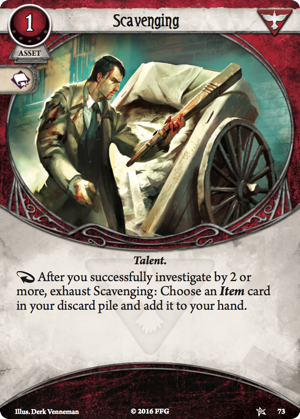 |
| You can kill some giant vampire with this stake |
Strength
Theme
All images are courtesy of cardgamedb.com and fantasyflightgames.com
1Or more if you’re a slow reader.
2Again more if you’re a slow reader.
3Sometimes clues represent more of facts,
information; sometimes they are more of concrete pieces of evidence you need to
find or even objects you will use, or locate.
4I believe you’ve noticed the pattern already,
haven’t you?
5Regardles of your reading pace.
6It is the case for all the personal weaknesses,
I know. However Rex’ curse seem to require bit more in this regards – maybe it
should start the game in play? Or would it be too harsh?















